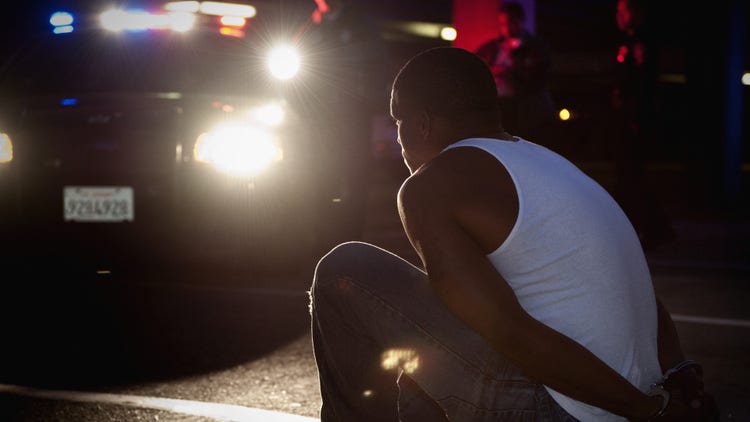
The views expressed in this article are those of the author and do not necessarily reflect the official policy or position of any other agency, organization, employer or company.
I have haunting memories of being pulled over by Memphis police officers in 2017 at the same intersection of Airways and I-240 almost four times in one month, having done nothing wrong but be Black in a Black-majority area. That’s how the discrimination and over-criminalization begins. Police officers flood an area and pull over folks for pretextual traffic stops, which should mean infractions like broken brake lights or expired tags, but the actual pretext is being Black.
What’s happening with the story of Tyre Nichols is one of many, most of which don’t catch media attention, but the community knows. A friend told me about the terrors of police in the 1980s under Shelby County Sheriff Jack Owens. Residents of North and South Memphis have vivid memories of being over-policed and terrorized by sheriff’s deputies under the direction of Sheriff Owens. During his tenure in June of 1989, a Black man named Michael Gates was beaten to death during a “jump and grab” undercover sting operation in which officers posing as drug dealers would detain suspects after a transaction. A medical examiner said Gates died from being choked and had numerous bruises on his body, many shaped like shoe prints. Now, 34 years later, the same “jump and grab” task forces are still being used and killing Black folks in our communities.
That’s the history of Memphis policing — no matter the number of incidents or complaints, we continue to be over-policed with dangerous and oftentimes life-ending tactics. Sheriff Owens took his life at a service station in North Memphis on May 5, 1990 and at the time of his self-inflicted death, he was under investigation for civil rights violations linked to the case of Gates and other incidents. Due to advances in technology, we have data that shows not only how Black and Brown folks in Memphis are discriminated against, but how the system of policing is a tool of white supremacy used to keep Black folks in constant fear and a state of trauma funded by the city and county government.
You might find yourself asking, “How do the citizens of a Black-majority city with most political and government offices being held by Black people experience so much targeted discrimination?” It is because of white supremacy culture, which is the ideology that white people and the ideas, thoughts, beliefs, and actions of white people are superior to people of color and their thoughts, ideas, beliefs, and actions. We see this culture play out often when Black folks in Memphis talk about their experiences with police. This culture also guides how our communities are targeted by task forces.
In the ‘80s and ‘90s, the majority of task forces were in the North Memphis and South Memphis communities. But since 2012, I’ve noticed an uptick of them being in East Memphis neighborhoods such as Hickory Hill, Parkway Village, and Whispering Meadows. East Memphis, an area that was once considered a suburb, felt the effects of white flight heavily, losing more than 50 percent of its white residents between 2000 and 2020. According to MLK50, Hickory Hill lost 78.6 percent of its white residents over the last 20 years, making it a target for over-policing as the median income in the area drastically decreased. This same area is where Nichols lived.
I know from research with Decarcerate Memphis that the median income level of households is a key determining factor of which areas police choose to target with heavy traffic enforcement through pretextual stops by task force agencies. The Memphis Police Department uses task forces to flood what they consider to be high-crime areas with officers who conduct pretextual traffic stops. Decarcerate Memphis studied traffic stops that had citations issued from 2017-2021 and found clear patterns of discrimination. Black men were cited 3.4 times more than white men, and Black women were cited 4.7 times more than white women.
According to data from the Memphis Police Department, from 2017-2021, Black drivers were cited 10 percentage points more than their own population. Black drivers were also twice as likely as white drivers to receive multiple citations on one ticket. So even in a Black-majority city, Black drivers are disproportionately targeted. Just over half of Black drivers’ citations were not even about public safety compared to only a quarter of white drivers’ citations. According to the Shelby County Clerk’s Office, traffic enforcement is concentrated in low-income areas and as the median income of a ZIP code decreases, its drivers appear more frequently in court. This tactic is one of the main practices used to keep poor Black folks impoverished by constantly burdening them with financial hardships.
So what are Black Memphians’ experiences with Memphis police? Terror, trauma, and discrimination. This is why I implore folks to recognize that the story of Tyre Nichols is not an anomaly; it’s actually the everyday experience of Black folks in Memphis — some just live to tell the story. In my own experience, I’ve seen in my community how now that the majority of white residents have left, police have started heavier traffic enforcement as a way to cause poor Black folks more financial hardship, discriminate, over-police our communities, and traumatize us. That is how the system of white supremacy works and the Memphis Police Department upholds that.